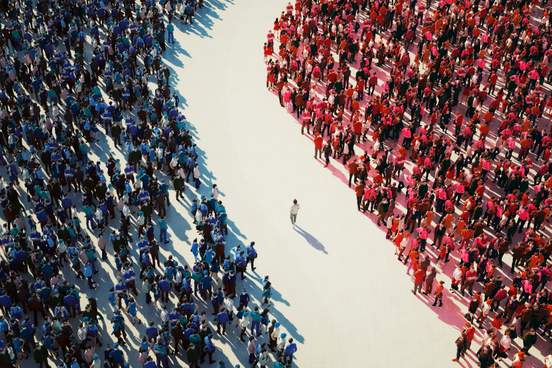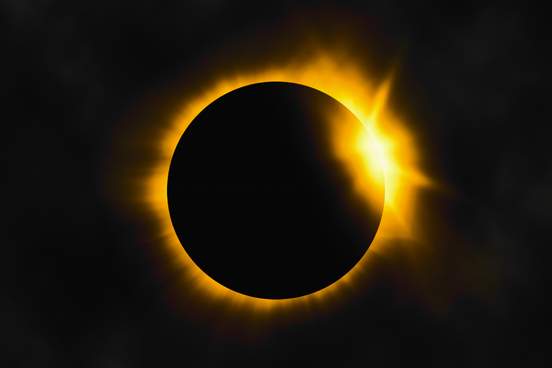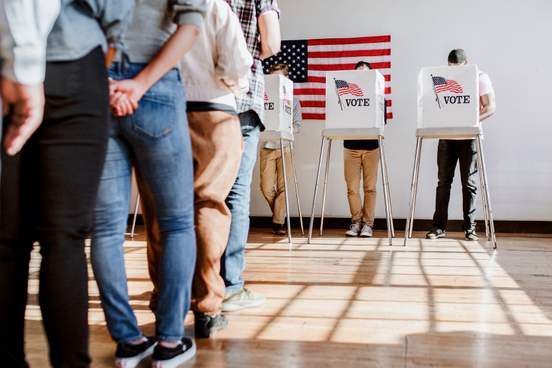
Polarization
Merriam-Webster’s 2024 Word of the Year is polarization, which happens to be one idea that both sides of the political spectrum agree on. Search volume on Merriam-Webster.com throughout the year reflected the desire of Americans to better understand the complex state of affairs in our country and around the world.
We define polarization as “division into two sharply distinct opposites; especially, a state in which the opinions, beliefs, or interests of a group or society no longer range along a continuum but become concentrated at opposing extremes.”
The word was widely used across the media landscape. Fox News reported that “Vance's debate answer on immigration crisis shows voter polarization,” while MSNBC observed that, “The 2024 presidential election has left our country more polarized than ever.” The word was also used to describe divides beyond the U.S. election, as when Forbes warned that in workplaces, “cultural polarization is becoming a pressing challenge.”
Polarization, and the verb polarize, date back to the early 1800s, when they first described light waves. That physical meaning of polarize—“to cause to vibrate in a definite pattern”—led to the political and cultural meaning that helps define the world today.
The polar in polarization is from Latin polaris, which describes the Earth’s poles. Polaris is also a name for the North Star.
Other words that stood out in our lookup data in 2024 are:

Totality
In April, the moon generated astronomical excitement when it passed in front of the sun and cast a narrow shadow across 13 U.S. states, briefly turning day into night. The allure of experiencing totality, “the phase of an eclipse during which it is total; the state of total eclipse,” inspired much travel and commentary, and introduced many to a less common meaning of a word that rarely piques interest.

Demure
In August, TikToker Jools Lebron posted the first of a series of videos with a catchphrase that went viral. “You see how I do my makeup for work?” she asked. “Very demure, very mindful.” The phrase “very demure, very mindful” became a meme, and demure surged in use, with TikTokers and others posting about it, and brands eagerly trying it on. In its earliest use in the 14th century, demure described people who avoid drawing attention to themselves. Since then, it has also come to describe those whose shyness is a bit of an act.

Fortnight
Taylor Swift’s song “Fortnight” yanked a primarily British word meaning “a period of 14 days; two weeks” out of relative obscurity and into our frequent lookups. In use for more than 700 years, fortnight comes from the Old English term fēowertȳne niht, “fourteen nights.” It remains to be seen whether Swift’s use of the term will lead to its wider adoption in American English.

Pander
Pander (“to say, do, or provide what someone wants or demands even though it is not proper, good, or reasonable”) spiked in lookups starting in mid-October, when both sides in the presidential election used it to mock the other. Conservative news outlets accused Vice President Kamala Harris of pandering to different groups, including young voters, Black voters, and supporters of gun rights. And in an appearance on The View, Tim Walz said that Donald Trump’s visit to the kitchen of a fast food restaurant showed that he would “pander and disrespect McDonald’s workers.”

Resonate
Resonate spiked in lookups following news about how much the word appeals to that most prolific of contemporary writers: ChatGPT. Resonate (along with explore, captivate, and tapestry) was identified as a ChatGPT fave. Defined in part as “to affect or appeal to someone in a personal or emotional way,” the word also appeared frequently in news stories about political positions and issues resonating with voters.

Allision
Baltimore’s Francis Scott Key Bridge collapsed in March when the container ship Dali ran into it, causing the death of six construction workers, the destruction of a portion of Interstate 695, and a months-long halt to port operations. News sources referred to the event as a collision but maritime publications mostly used allision instead. The difference is this: allision occurs when a ship runs into a stationary object, while collision, according to some traditional definitions, refers only to contact between two moving objects. (As recently as 2015 the New York Times Manual of Style and Usage insisted that “only two objects in motion can collide.”) However, collision and collide are commonly used to refer to such matters as a ship striking a bridge, or any object striking a stationary object, and we consider the use of collision in this context appropriate and correct.

Weird
In late July, vice-presidential candidate Tim Walz referred to “weird people on the other side.” The word (meaning “of strange or extraordinary character”) went viral, becoming one more strange and/or extraordinary detail of the 2024 political season. Weird seemed to be directed at not only the policies, but also the appearance and behavior, of the opposing candidates.

Cognitive
For multiple reasons relating to the U.S. election, this year saw a notable rise in lookups of cognitive—meaning “of, relating to, being, or involving conscious intellectual activity (such as thinking, reasoning, or remembering).” At the end of February, reports of President Biden’s annual physical noted that a “cognitive test” was not part of the assessment. Biden’s debate performance in July raised further concerns about his “cognitive ability.” In mid-October, another spike accompanied coverage of what some described as Donald Trump’s “cognitive decline.” Following the election, the term “cognitive dissonance” (“psychological conflict resulting from incongruous beliefs and attitudes held simultaneously”) appeared in discussions about states that voted against restrictions on access to abortion, but for President Trump.

Democracy
Along with related searches like “representative democracy” and “democracy vs. republic,” democracy saw a large increase in lookups throughout the year as people tried to fully understand what it means—and to challenge, celebrate, and protect it. The word received bipartisan attention across red states and blue states, from those who consider it triumphant and those who think it’s at risk. The word democracy never appears in the Declaration of Independence or the Constitution, but it has long been a focus of American and global attention, rarely more so than now.





